高考英语情景交际精讲
高考英语情景交际知识点
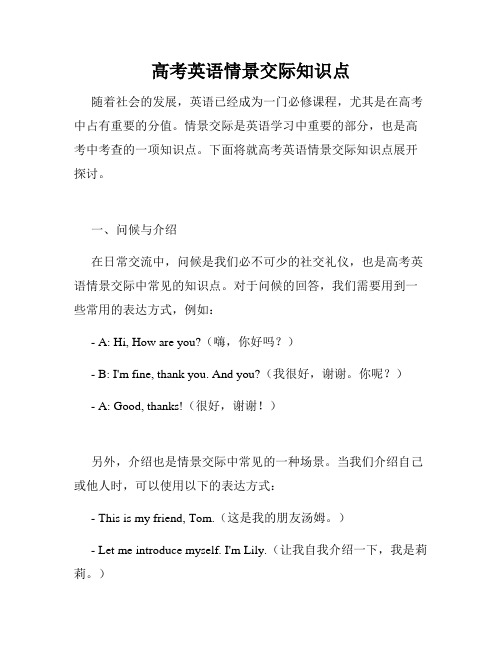
高考英语情景交际知识点随着社会的发展,英语已经成为一门必修课程,尤其是在高考中占有重要的分值。
情景交际是英语学习中重要的部分,也是高考中考查的一项知识点。
下面将就高考英语情景交际知识点展开探讨。
一、问候与介绍在日常交流中,问候是我们必不可少的社交礼仪,也是高考英语情景交际中常见的知识点。
对于问候的回答,我们需要用到一些常用的表达方式,例如:- A: Hi, How are you?(嗨,你好吗?)- B: I'm fine, thank you. And you?(我很好,谢谢。
你呢?)- A: Good, thanks!(很好,谢谢!)另外,介绍也是情景交际中常见的一种场景。
当我们介绍自己或他人时,可以使用以下的表达方式:- This is my friend, Tom.(这是我的朋友汤姆。
)- Let me introduce myself. I'm Lily.(让我自我介绍一下,我是莉莉。
)二、询问与回答问题在日常生活中,我们常常需要询问和回答一些问题。
以下是一些常见的询问与回答方式:- A: Can you tell me the way to the nearest supermarket?(请问,你能告诉我去最近的超市的路吗?)- B: Sure. Go straight and turn left at the second traffic light. It's on your right.(当然。
一直往前走,在第二个红绿灯处左转,它在你的右边。
)- A: What's the weather like today?(今天天气怎么样?)- B: It's sunny and hot.(天晴炎热。
)- A: How do you like the movie?(你觉得这部电影怎么样?)- B: I think it's great.(我觉得很好。
高考英语情景交际及习惯表达知识点图文解析(4)
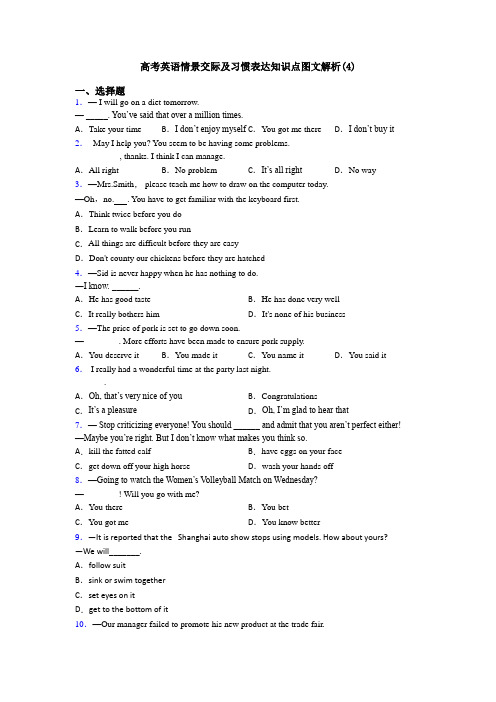
高考英语情景交际及习惯表达知识点图文解析(4)一、选择题1.— I will go on a diet tomorrow.—_____. You’ve said that over a million times.A.Take your time B.I don’t enjoy myself C.You got me there D.I don’t buy it 2.- May I help you? You seem to be having some problems.- _________, thanks. I think I can manage.A.All right B.No problem C.It’s all right D.No way 3.—Mrs.Smith, please teach me how to draw on the computer today.—Oh,no. . You have to get familiar with the keyboard first.A.Think twice before you doB.Learn to walk before you runC.All things are difficult before they are easyD.Don't county our chickens before they are hatched4.—Sid is never happy when he has nothing to do.―I know. ______.A.He has good taste B.He has done very wellC.It really bothers him D.It's none of his business5.—The price of pork is set to go down soon.—________. More efforts have been made to ensure pork supply.A.You deserve it B.You made it C.You name it D.You said it 6.-I really had a wonderful time at the party last night.-______.A.Oh, that’s very nice of you B.CongratulationsC.It’s a pleasure D.Oh, I’m glad to hear that7.—Stop criticizing everyone! You should ______ and admit that you aren’t perfect either!—Maybe you’re right. But I don’t know what makes you think so.A.kill the fatted calf B.have eggs on your faceC.get down off your high horse D.wash your hands off8.—Going to watch the Women’s Volleyball Match on Wednesday?—________! Will you go with me?A.You there B.You betC.You got me D.You know better9.—It is reported that the Shanghai auto show stops using models. How about yours?—We will_______.A.follow suitB.sink or swim togetherC.set eyes on itD.get to the bottom of it10.—Our manager failed to promote his new product at the trade fair.—No wonder he is_________these days.A.on cloud nine B.off the top of his headC.down in the dumps D.economical with the truth11.—How come Tom picked a quarrel with his wife?—________? We also have the occasional argument.A.What’s on B.How’s thatC.Who doesn’t D.Why not12.-You don’t seem to be on good terms with your partner, Jack.-______. I’m not quite myself these days and don’t want to talk, that’s all.A.Not exactly B.Not at all C.Never mind D.Not a little 13.My friends thought “I had lost my mind”, which means they t hought .A.I was very much depressed B.I had lost my heartC.I was in severe lack of confidence D.I had been mad and crazy 14.—Darling, I'm tired. Would you make supper?—_______________! You've one nothing all day.A.Nice try B.It's settled C.Allow me D.Fair enough 15.—Andrew said he would be here by 8.—_____. He has never been punctual for anything in his life.A.You said it.B.I wouldn’t bet on it C.You asked for it D.I can’t agree more 16.—________—Thank you. I certainly will.A.I wish you succeed.B.What can I do for you?C.I greatly appreciate our friendship.D.Remember me to your family.17.—It’s very kind of you to give me a lift back home.—____________. I'm just driving your way.A.With pleasure B.It doesn't matter.C.That's right.D.Think nothing of it. 18.The door to the secret garden was locked ____________ years ago.A.nine B.eight C.ten D.eleven 19.—How about Amanda’s fresh year in college?—Very great!You know,she is___________and she got high grades in every subject.A.a black sheep B.an early bird C.a wet blanket D.a green hand 20.—Sorry, I forgot to lock the door.—______ Mike can do it later.A.No way B.Take your timeC.Nothing serious D.You're welcome21.—Betty was feeling pretty blue for a while, but she’s better now.— _________.A.Congratulations B.It’s my pleasureC.Oh, that’s kind of you D.Oh, I’m glad to hear that22.--- Jack, I’d like to have your opinions about my written report.--- _______. But I have one suggestion.A.That’s a good idea B.You are too modestC.It looks fine to me D.You should check it first23.—I guess this dress no longer fits me. I am almost 30.— ______ ? You look pretty in it!A.What if B.Why notC.How about D.How come24.—Let’s go for a picnic this weekend together with our classmates, OK?—_______. I love getting close to nature.A.I couldn’t agree more B.That’s all rightC.Out of the question D.I’m afraid not25.—Linda, would you like to come and taste the dishes I have cooked?—Don’t ______. You even don’t know how to fry an egg.A.rain cats and dogs B.pull my leg C.be all ears D.be all thumbs 【参考答案】***试卷处理标记,请不要删除一、选择题1.D解析:D【解析】【分析】【详解】考查情景交际。
高考英语情景对话题分析讲解汇编

情景对话题汇编1. 用来回答感谢或类似于感谢的句子,意为:不用谢;不客气;不要这样说;哪里哪里。
如:A:Thank you very much. 太感谢你了。
B:Don’t mention it. 别客气。
A:The film was wonderful. Thank you for inviting me. 这电影很精彩,谢谢你邀请了我。
B:Don’t mention it. I’m glad you enjoyed it. 别客气,你喜欢就好了。
A:You are so kind. 你太客气。
B:Don’t mention it. 哪里哪里。
2. 用来回答道歉,意为:没关系。
如:A:I apologize for what I said. 对不起,我说错了。
B:Don’t mention it. 没关系altogether的用法表示“总的说来” (通常置于句首)。
如:It was raining, but altogether it was a good trip. 虽然天下着雨,但总的说来旅途还是很愉快Not at all是回答thank you或者thanks的就是“不客气”或者“不用谢”的意思That's all right是回答Sorry的就是“没关系”的意思It's a pleasure.这是我乐意做的!该句型是用来回答感谢之类的话的客气话。
意为“能帮上你的忙我很高兴;不客气,不用谢”。
也说My pleasure.或A pleasure.I enjoyed helping you.Believe me,it's a pleasure.我愿意帮你的忙。
真的,能帮助你我很高兴。
A:—Thank you very much for passing the message on to him!非常感谢你把口信传给了他!B:—It's a pleasure!请别客气!A:—Thanks for helping me yesterday!多谢你昨天帮助我!B:—My pleasure!Nice to see you again!不用谢!很高兴又见到你!With pleasure!该句型是表示答应对方请求的客气话。
高考英语情景交际用法详解

高考英语情景交际用法详解一、单项选择情景交际1. — Are you going to take part in the speech contest?—________ It’s too good an opportunity to miss.A. No problem.B. That’s for sure.C. Why me?D. How come?【答案】B【解析】【详解】考查交际用语。
句意: ——你准备参加演讲比赛吗?——那当然, 这是个不容错过的好机会。
A.No problem.没问题;B.That’s for sure.那当然, 毫无疑问;C.Why me? 为什么是我;D.How come? 为什么, 怎么回事。
根据后半部分他做出的回答, 可知该处应做出爽快的肯定式回答, 故选B。
【点睛】本题有两个易错点, 应引起注意。
一是回答中的“too…to…”结构, 学生可能会据此直接判定为否定, 但结合miss(错过)的含义, 应为“不容错过的好机会”, 类似于双重否定表肯定;二是No problem.与That’s for sure.的辨析, 虽然两者都是一种爽快的肯定, 但前者更多用于答应别人提出的请求, 而后者则用于给予别人问题一个肯定的回答(对别人的说法表示赞同), 两者应注意区别。
2. ---You don't so well, Betty.What's the matter with you?---I’m going to have the first round of interview tomorrow, so I’m____.A. feeling on cloud nineB. feeling hot under the collarC. felling down in the dumpsD. feeling butterflies in my stomach【答案】D【解析】【详解】考查习惯用语。
高考英语 语法专题复习 情景交际试题精解

落堕市安心阳光实验学校语法专项(十四) 情景交际考点一交际用语分组记忆第一组1.Good luck.“祝你好运”,表示当对方参加某项活动,如考试、比赛等时,向对方表示祝福的用语。
Congratulations!当对方取得了成功或其他好的事情时,对对方的祝贺语。
2.Have fun!“玩得开心点!”表示对对方去娱乐时的祝愿用语。
3.Best wishes.一般用于信的结尾处表示对对方的祝愿。
第二组1.It's a/my pleasure.(=My pleasure.)“这是我的荣幸”“不客气”,用于别人对你表示感谢时的回答。
2.With pleasure.“我很乐意(帮你)”,表示同意对方的请求,并且自己将付出行动。
第三组1.What's (going) on?“怎么了?”“这里发生什么事了?”“有什么节目?”“上演什么电影?”(询问情况)。
2.What's for?表示目的和用途,一般翻译成“为了什么?”“用来做什么?”“干嘛?”3.What's up?“怎么了?”“有什么事吗?”这句在口语中使用比较广泛。
如有人叫住你或登门访问,而你不明白对方的来意时就可以说“what's up?”(有什么事?有何贵干?)年轻人也常用“What's up?”来打招呼。
如:Hi! Jack, what's up?喂!杰克,近来怎么样?4.What if...=What will or would happen if...?“如果(假如)……将会怎么样?”5.So what?“那又怎么样?”(表示“无所谓”的样子)6.What of it?“那有什么关系呢?“那又怎样?”7.How come?“怎么回事?”“怎么搞的?”“为什么?”“怎么会这样?”通常用在你觉得奇怪而问为什么的时候。
当你不愿回答别人的某个问题时也可以说:“How come?”意思是“Why do you ask that? It's none of your business.”。
高考英语一轮复习 情景交际讲解

入舵市安恙阳光实验学校高考英语一轮复习讲解:情景交际【知识要点】对情景交际的考查是英语高考中的一种潮流。
它的目的主要在于考查考生对英语知识的理解及应用,从而检测出考生对英语的驾驭能力。
国家高中英语新课标列出了11个方面共66个功能意念项目以及24个话题项目。
下面是最常用的一些情景交际语境。
1.Introduction(介绍)—This is Mr Smith.—Nice/Glad/Pleased to meet you.—How are you doing?—Very well,thank you.—Thank you very much.—It’s a pleasure./My Pleasure./That’s OK./You’re welcome./Don’t mention it./That’s all right.—I’m sorry for losing your radio.—That’s OK./It’s all right./Never mind./It’s nothing./Forget it./It doesn’t matter.—Would you like to have a cup of coffee?—Thank you./No, thank you.—Would/Do you mind my smoking here?—Of course,you can./Go ahead,please.I’m sorry,it’s not allowed./I’m afraid not.—I’m going to have an English Exam.—Good luck!—I have just won the first prize in the maths competition.—Congratulations!—Shall I help you with that?—Yes,please./Yes,thanks.No,thanks./Thank you all the same.—Let’s make it at 5:30.—All right.See you then.—Hello! May I speak to Tom?/Is that Tom speaking?—Just a moment, please./Sorry. He isn’t in just now. /Hold the line, please. /Hello. This is Mary speaking.—Would you like something to eat/drink?—Yes,I’d like a drink./I’d like rice and chicken.No,thank you.I’ve had enough.—What’s the matter?—I’m not q uite myself./I feel terrible(bad,horrible...).I have a headache./There is something wrong with....—What can I do for you?/May I help you?—I want/I’d like a pair of sports shoes.—Excuse me.Where is the post office?/Excuse me.Which is the way tothe post office?/Can(Could) you tell me the way to the post office?/How can I get to the post office?—It’s over there./Go down this street until you see the tall red building.You can’t miss it./You can take bus No.23./Turn left at the first crossing./Sorry,I don’t know.I’m a stranger here.—What’s the weather like today?/How is the weather today?—It’s nice/fine/sunny/cloudy/rainy/snowy/foggy.[ 16.Sympathy(同情)—My mother is ill.I have to stay at home and look after her.—I’m sorry to hear that.—How often do you go to movies?—Once a week.—You speak excellent English.—Thank you.典题链接英语是一种交流工具。
广东小高考英语的情景交际
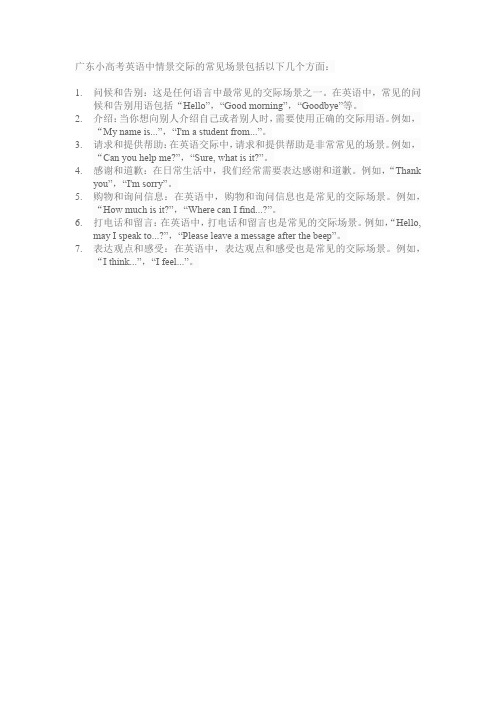
广东小高考英语中情景交际的常见场景包括以下几个方面:
1.问候和告别:这是任何语言中最常见的交际场景之一。
在英语中,常见的问
候和告别用语包括“Hello”,“Good morning”,“Goodbye”等。
2.介绍:当你想向别人介绍自己或者别人时,需要使用正确的交际用语。
例如,
“My name is...”,“I'm a student from...”。
3.请求和提供帮助:在英语交际中,请求和提供帮助是非常常见的场景。
例如,
“Can you help me?”,“Sure, what is it?”。
4.感谢和道歉:在日常生活中,我们经常需要表达感谢和道歉。
例如,“Thank
you”,“I'm sorry”。
5.购物和询问信息:在英语中,购物和询问信息也是常见的交际场景。
例如,
“How much is it?”,“Where can I find...?”。
6.打电话和留言:在英语中,打电话和留言也是常见的交际场景。
例如,“Hello,
may I speak to...?”,“Please leave a message after the beep”。
7.表达观点和感受:在英语中,表达观点和感受也是常见的交际场景。
例如,
“I think...”,“I feel...”。
高考英语情景交际用法总结附练习题(完整)

高中英语情景交际总结及练习1.回答对方感谢(Thanks)—Thank you!—It’s a pleasure./My pleasure./Don’t mention it./That’s all right./You are welcome. 2.回答对方道歉(Apologies)—Sorry.—Never mind./It doesn’t matter./It’s all right./Forget it./That’s all right.3.回答对方请求—Can I.../Could I.../Would you mind if I...—1)Yes, please./Sure./Certainly./Of course./Please do./Of course, you can./Go ahead, please.—2)I am sorry; it’s not allowed./I’m afraid not./You’d better not./I’d rather you didn’t.4.回答对方提供帮助—Would you like me to help...—1)Yes, please./That’s very kind of you./Thank you. That would be nice./Thank you for your help.—2)No, thanks./Thank you all the same./It’s very kind of you, but I can manage it myself.5.表示同意和不同意—1)Sure./certainly./Exactly./Absolutely./That’s correct./Of course./All right.(好的)/I agree./I can’t agree more./That’s a good idea./Yes, I think so./ That’s exactly what I was thinking./That’s just how I see it.—2)No way./Of course not./I’m afraid I don’t agree./I don’t think so./Well, it depends./Well, I am not sure about it.6.几个常见的短语:1.So do I. “So+助动词+主语”表述前面一种表肯定意义的情况也适合后面的另一个人,意为“某人也一样”。
高考英语情景交际(七选五)精讲精练及(解析)答案

高考英语情景交际(七选五)精讲精练及(解析)答案情景交际常考点******习惯应答类高考英语情景交际常考点有哪些?结合历年的高考题,总结如下:一、习惯应答类二、打破交际定势类三、语言结构类近几年高考对日常交际用语的考查比重增大,题型也日趋灵活和多样化。
要注意中西方思维和表达上的差异命题,同时要了解英语中常见俗语、谚语,并能在具体语境中恰到好处地运用。
一、习惯应答类许多情景对话中使用的是英美人的习惯用语。
问候、告别、打电话、问路、看病、购物等常见的交际话题均有其较为固定的套语;感谢、道歉、祝愿、请求亦有其固定的应答用语。
对于这类题目,我们要遵循他们的习惯进行回答。
如:①常用于感谢的应答用语有:You are welcome.Don't mention it.It's my pleasure.=My pleasure.Not at all.That's all right. / It's all right.That's OK. / It's OK.That's nothing. / It's nothing.Forget it.No problem.②常用于道歉的应答用语有:Never mind.It doesn't matter.That's all right. / It's all right.That's OK. / It's OK.That's nothing. / It's nothing.Forget it.No problem.③常见的祝愿和祝贺用语有:Good luck!Best wishes to you!Wish you a pleasant journey!Have a nice time.Congratulations!Merry Christmas!而应答用语有:Thank you./The same to you./You too.④接受请求和邀请的应答用语有:With pleasure.I'd be happy/glad to.Good idea.Sounds good.Why not?⑤拒绝请求和邀请的应答用语有:Sorry,but...I'd rather you didn't.Thank you,but...No way!Forget it.⑥其他场景习惯应答用语考生也应注意。
高三英语总复习课件:语法16情景交际

I think it's time for us to leave now.
It's time I met/did.../I had to go now. It's about time I was going, I'm afraid.
选修八
Units 3-5
专项语法十六
情景交际
《 走 向 高 考 》 高 考 总 复 习 英 语 配 人 教 实 验 版
· ( )
首页
上页
下页
末页
选修八
Units 3-5
要点精析 一、告别(Farewells) 常用表达法: 1.I'm afraid I must be leaving/going now.
不到双方了,则一般在说Goodbye前用比较正式且严肃的
告别用语,如Take care.; Give my best wishes to your family.。
· (
(3)人们经常使用挥手来表示告别。
(4)告别时,易犯汉语习惯式的表达错误:I've wasted a lot of your time.和I'm sorry to have taken up so much of your time.后者主要是用在你请别人花费很多时间帮忙时。
《 走 向 高 考 》 高 考 总 复 习 英 语 配 人 教 实 验 版 )
(2)无论是书面还是口头邀请,都有多种表达法,但
要注意避免使用命令式的口气。如:You covening.
· (
(3)在被邀请时,如若不去,应当找出适当的理由向
高考英语 考点一遍过 专题 情景交际(含解析)

落堕市安心阳光实验学校考点39 情景交际高考频度:★★★★★高考常考情景交际用语:1.A pleasure与With pleasureA pleasure.=My pleasure=It’s a pleasure. 意为"不用谢",当别人表示感谢时用它来回答With pleasure. 意为"非常乐意",当别人请自己帮忙时,自己爽快的接受(伴随着快乐)。
1.—Would you do me a favor and give me a ride ?— ______ .A. Yes, that’s rightB. No troubleC. Never mindD. With pleasure2.—Could you do me a favor and take these books to my office?—Yes, ________.A. for pleasureB. I couldC. my pleasureD. with pleasure【答案】1.D 2.D2.Don’t mention it.与you’re welcome.Don’t 'mention it(informal) used as a polite answer when sb has thanked you for sth:‘Thanks for all your help.’ ‘Don’t mention it.’两个短语用法较简单,意为"不用谢"A:Thank you very much. 太感谢你了。
B:Don’t mention it. 别客气。
3.No problemed to show that you are happy to help sb or that sth will be easy to do:2.‘Can I pay by credit card?’ ‘Yes, no problem.’ed after sb has thanked you or said they are sorry for sth:4.‘Thanks for the ride.’ ‘No problem.’1.—I’m sorry to have kept you waiting.—___________, Bill.A. You’re welcomeB. Go aheadC. Don’t mention itD. No problem2.—We need three single rooms for the first week in June.—___________. The hotel’s not busy then.A. No problemB. Don’t botherC. Never mindD. It doesn’t matter【答案】1.D 2.A4.Mind当问你是否介意(某人)做某事时,如果你同意,那就是不介意,要用no 来回答;如果你不同意,那就是介意,要用yes来回答。
高考英语情景交际常见用语PPT精美版

7:征求意见许可
• 英语中用来表达征求意见许可的常用语有: • 1. May/Could/Can I...? • 2. Would/Do you mind if I...? • 3. I wonder if I... • 4. Is it OK?
• 英语中用来应答征求意见许可的常用语有: • 1. Yes, please/I do. 2. Sure/Certainly. • 3. Of course, you can. • 4. Please do. • 5.Go ahead, please. • 6. Do as you please. • 7. You’d better not. • 8. I’m afraid/I am sorry,you can’t.
• 1.—It looks heavy. Can I give you a hand? —_____. A. No, thanksB. Yes, my pleasureC. No, never mindD. Yes, I do
• 分析:A。对别人提供的帮助表示拒绝
2. —Would you please help me with the box?
4:感谢与应答
• 英语中常见的感谢用语有: • 1. Thank you very much. • 2. Thanks a lot for... • 3. Thank you for your help. • 4. It’s very kind of you. • 5. I appreciate your help. • 6. I am extremely grateful to ...
• 英语中表达应对建议的常用语有: • 1. All right/OK. • 2. It’s a good idea. • 3. Why not? • 4. I’d like to, but I... • 5. I’d love to.
高考英语情景交际讲解(表格解析汇报)
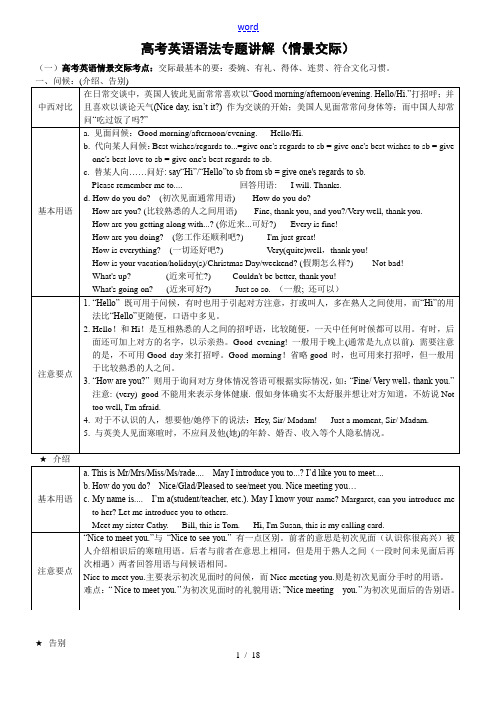
高考英语语法专题讲解(情景交际)(一)高考英语情景交际考点:交际最基本的要:委婉、有礼、得体、连贯、符合文化习惯。
一、问候:(介绍、告别)★告别二、邀请(约会)三、感和应答:四、道歉、遗憾和应答(责备和抱怨; 提醒)考点:Perhaps/Maybe. It’s hard to say . I have no idea . It depends. It’s up to you . No chance. No t asfar as I know . That’s right.难点:It depends.“视情况而定’’,表目前尚不确定,待情况发展而定。
I have no idea .”不清楚、不知道’’,表说话者对此事不曾知晓。
如:--Has Bob finished his homework? --I have no idea .It’s up to you.“你看着办吧’’,表说话者无所谓或无权作出决定,靠对方自己作出决定。
同意:Certainly /Sure/Of course/Exactly .No problem.Yes ,please.Yes,I think so .All right’s a good idea.Sounds good. I couldn’t agree more.I will.With pleasure.Sure, go ahead. Yes, help yourself. I dare say, .I should think so.If you like, Why not? So it is.不同意:No. I don’’m afraid not. No way. Far from it. Forget it. No chance.难点::No chance.决不可能,即说话者确信某事不可能发生;I couldn’t agree more .我非常赞成或我再同意不过了。
语法精讲(十三) 情景交际
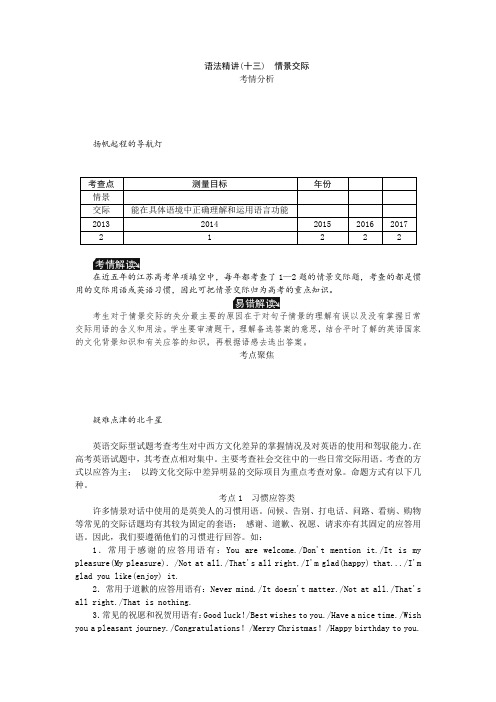
语法精讲(十三)情景交际考情分析扬帆起程的导航灯在近五年的江苏高考单项填空中,每年都考查了1—2题的情景交际题,考查的都是惯用的交际用语或英语习惯,因此可把情景交际归为高考的重点知识。
考生对于情景交际的失分最主要的原因在于对句子情景的理解有误以及没有掌握日常交际用语的含义和用法。
学生要审清题干,理解备选答案的意思,结合平时了解的英语国家的文化背景知识和有关应答的知识,再根据语感去选出答案。
考点聚焦疑难点津的北斗星英语交际型试题考查考生对中西方文化差异的掌握情况及对英语的使用和驾驭能力。
在高考英语试题中,其考查点相对集中。
主要考查社会交往中的一些日常交际用语。
考查的方式以应答为主;以跨文化交际中差异明显的交际项目为重点考查对象。
命题方式有以下几种。
考点1 习惯应答类许多情景对话中使用的是英美人的习惯用语。
问候、告别、打电话、问路、看病、购物等常见的交际话题均有其较为固定的套语;感谢、道歉、祝愿、请求亦有其固定的应答用语。
因此,我们要遵循他们的习惯进行回答。
如:1.常用于感谢的应答用语有:You are welcome./Don't mention it./It is my pleasure(My pleasure)./Not at all./That's all right./I'm glad(happy) that.../I'm glad you like(enjoy) it.2.常用于道歉的应答用语有:Never mind./It doesn't matter./Not at all./That's all right./That is nothing.3.常见的祝愿和祝贺用语有:Good luck!/Best wishes to you./Have a nice time./Wish you a pleasant journey./Congratulations!/Merry Christmas!/Happy birthday to you.而应答用语有:Thank you./The same to you./You too.4.接受请求和邀请的应答用语有:With pleasure./I'd be happy(glad) to./Yes, help yourself./No problem./Good idea./Sounds good./Why not?拒绝请求和邀请的应答用语有:Sorry, but.../I'd rather you.../Thank you, but.../Forget it.5.其他场景的习惯应答用语考生也应注意。
- 1、下载文档前请自行甄别文档内容的完整性,平台不提供额外的编辑、内容补充、找答案等附加服务。
- 2、"仅部分预览"的文档,不可在线预览部分如存在完整性等问题,可反馈申请退款(可完整预览的文档不适用该条件!)。
- 3、如文档侵犯您的权益,请联系客服反馈,我们会尽快为您处理(人工客服工作时间:9:00-18:30)。
高考语法专项-----情景交际1.常考类型2.易混类型辨析典型例题【例1】(2013·高考江苏卷)—Thank you for the flowers.—________.I thought they might cheer you up.A.That’s right B.All rightC.I’m all right D.It’s all right解析:选D。
句意:“谢谢你送给的花。
”“不用谢。
我想它们可以让你振作起来。
”That’s right那是对的;All right行,可以;I’m all right 我没事儿,我很好;It’s all right没关系(可对Thank you或Sorry进行回答)。
由句意可知,这里是表达“不用谢”。
[易错剖析]本题学生容易误选B。
all right意为“好吧”。
是对邀请的应答。
【例2】(2013·高考江苏卷)—The T-shirt I received is not the same as is shown online.—________?But I promise you we’ll look into it right away.A.Who says B.How comeC.What for D.Why worry解析:选B。
句意:“我收到的这件T恤衫和网页上展示的不一样。
”“怎么会呢?不过我向您保证我们会立刻查清楚的。
”Who says 谁说的;How come怎么会(表达说话人的惊讶之情);What for为什么;Why worry 为什么担心。
这段对话是关于网购的,发生在买家和客服之间,根据答语中的But可知客服对于买家反映的情况表示惊讶,但还是承诺会查清楚。
[易错剖析]本题容易误选C。
受汉语影响太重,What for意为“为什么(目的)”,而How come意为“怎么回事”。
语法专项闯关:1.(2013·高考天津卷)—I’m going to Venice next week.—________.Carnival will be held then.Have fun!A.You’re crazy B.You’re luckyC.You’d better not D.You never know解析:选B。
由“Carnival will be held then.Have fun!”可知那时正值狂欢节,说明此人运气很好,故选B项“You’re lucky”。
You’re crazy你疯了,You’d better not你最好别去,You never know很难预料,你永远不了解,均与语境不符。
2.(2013·高考山东卷)—This is a really lively party.There’s a great atmosphere,isn’t there?—________.The hosts know how to host a party.A.Don’t worry B.Yes,indeedC.No,there isn’t D.It all depends解析:选B。
句意:“这确实是一个热闹的聚会。
这里的气氛真好,是吧?”“是的,确实是。
主人知道如何举办一个聚会。
”由题干中的关键信息“主人知道如何举办一个聚会”可知下句说话人赞同上句说话人所说的话,故选“Yes,indeed”。
Don’t worry.意为“别担心”;No,there isn’t.意为“不,不是”;It all depends.意为“看情况而定”,均不符合句意。
3.(2013·高考安徽卷)—How did your interview with the manager go?—________He seemed interested in my experience,but he didn’t ask for references.A.Perfect!B.I’m not sure.C.That’s right.D.Couldn’t be better.解析:选B。
句意:“你觉得与经理的面试怎么样?”“_________他好像对我的经历感兴趣,但他并没有求证。
”根据接下来的话可知,既有好的一面,也有不利的一面,显然说话人是模棱两可的。
故选B项。
4.(2013·高考新课标全国卷Ⅰ)—Why,this is nothing but common vegetable soup!—________,madam.It’s our soup of the day.A.So it is B.Let me seeC.Don’t mention it D.Neither do I解析:选A。
考查日常交际用语。
A项“的确如此”;B项“让我看看/想想”;C项“没关系”;D项“我也不……”。
根据“嗨,这只是普通的蔬菜汤!”这句话来判断,顾客是在抱怨,而答语是服务员对顾客的话做了“确认”回答,“确实如此,这就是我们今天的汤”。
根据对话的内容,该题只有选A项才符合上下文的语境。
5.(2013·高考新课标全国卷Ⅱ)—I’m sorry I made a mistake!—________.Nobody is perfect.A.Take your time B.You’re rightC.Whatever you say D.Take it easy解析:选D。
题干的意思是:“很抱歉我犯了一个错误!”“________。
没有人是完美的。
”通过答语后一句句意“没有人是完美的”可以判断所填部分的内容应该是安慰对方。
Take your time 意为“别着急,慢慢来”,用来提醒别人不用太匆忙;You’re right意为“你是正确的”;Whatever you say意为“无论你说什么”;Take it easy意为“别烦恼,不要生气”,用来安慰别人,所以正确答案为D。
6.(2013·高考安徽卷)—This is your order,a hamburger and an apple pie.________?—I’ll have it here.A.Anything else B.Is that OKC.For here or to go D.Something to drink解析:选C。
首先了解四个选项的意思。
A项Anything else?“还要别的东西吗?”;B项Is that OK?“这样可以吗”;C项For here or to go?“在这里吃还是带走?”;D项Something to drink?“要喝的东西吗?”。
根据答语I’ll have it here.可知应选C项。
句意:“这是您点的——一个汉堡包和一个苹果派。
您是在这里吃还是带走?”“我就在这里吃”。
7.(2013·高考浙江卷)—Hey,can I ask you a favor?—Sure,________A.here you are.B.just as I thought.C.how is it going?D.what can I do for you?解析:选D。
题干的意思是:“嗨,能请你帮帮忙吗?”“当然可以。
________”A项here you are.给你;B项just as I thought.我也是这么想的;C项how is it going?情况怎么样?D项what can I do for you?我能为你做点什么?由Sure可知,回答者已经同意帮助对方,所以正确答案为D项。
8.(2013·高考浙江卷)—Excuse me,but could I trouble you for some change?—________.Will pennies do?A.I know B.Never mindC.I am sure D.Let me see解析:选D。
题干的意思是:“打扰了,可以麻烦换点零钱吗?”“________。
便士可不可以?”A项“我知道”;B项“不要紧,没关系”;C项“我确定”;D项“让我看一看”。
由Will pennies do?可知对方是在查看,故D项正确。
9.(2013·高考山东卷)—How far can you run without stopping?—________.I’ve never tried.A.Don’t mention it B.That’s all rightC.I have no idea D.Go ahead解析:选C。
句意:“你不停地跑,能跑多远?”“我不知道。
我从未试过。
”通过对话中的关键信息“I’ve never tried.”可知答话者并不知道自己能跑多远,C项“我不知道”符合句意。
A项意为“不客气,不用谢”,用来回答别人的道谢;B项意为“没什么;不要紧;不用谢”,用来回答别人的道歉或道谢;D项意为“继续;说/用/拿/看吧”,用来表示允许对方做某事,这三项均不符合句意。
10.(2013·高考重庆卷)—Would you like a glass of wine?—________.I don’t drink.A.No,thanks B.Yes,pleaseC.I don’t like it D.It’s my favorite解析:选A。
题干的意思是:“来一杯酒怎么样?”“ _________________,我不喝酒。
”通过空格后的“我不喝酒”可知,空格处应作出否定回答。
A项意为“不,谢谢”;B项意为“好吧”;C项意为“我不喜欢它”;D项意为“它是我喜欢的”。
所以答案为A。
11.(2013·高考安徽卷)If parents have children help with housework,the children will feel needed.________,they will learn to take care of themselves.A.On the contrary B.In a wordC.That is to say D.What’s more解析:选D。
句意:如果父母让孩子们帮助做家务,那么孩子们会有被需要的感觉,而且,他们也能学会照顾自己。
on the contrary 相反;in a word总之,表示归纳总结;that is to say 也就是说,换句话说;what’s more 而且,表示递进或添加。
此处为递进关系,故选D 项。
12.(2013·高考陕西卷)—I’m tired.I’m taking next week off.—________,honey.You do need a break.A.Not so sure B.Forget itC.Great idea D.No way解析:选C。
